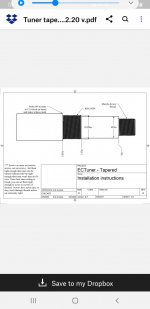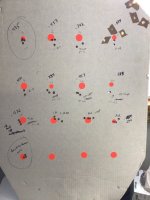First of all the kind of shooting we do?
WE, shoot a lot of different disciplines.
The guns WE own vary greatly, it's not all prs.
It's understandable that a high quality prs gun with finely tuned ammo may see less return on a tuner.
But that leaves all the rest of "WE" and a multitude of mixed equipment with various degrees of quality.
Some guns are limmited by magazine length and seating depth is limited by that and desired ammount of powder in the case.
Hell I heard some poor basterds don't even run a 24 inch barrel at times.
Like I said some of WE shooters appreciate what Eric Cortina does to help.
I hear mixed things about using a tuner to dial in otherwise less then satisfactory ammo/precision. I personally haven't tried it, so I'm willing to give people the benefit of the doubt on that. At some point, when I do have the opportunity to test factory ammo and a tuner, I would love to do so, for my own sake and knowledge.
I've been fascinated with tuners lately, with how popular they are starting to become on the "practical" side of the precision shooting sports. I've done a lot of reading on accurateshooter in regards to them, to see what BR and F-class guys are using them for. The opinions differ, and even how to use them differs. Hell, I even saw a world record BR shooter argue with a tuner maker on how to properly use a tuner. But mostly they seem to agree that a tuner isn't about adding precision to your load, but to use it to "widen the node" - to keep accuracy within extreme tolerances as temperatures and environmentals change throughout the match. Unlike what most of us shoot here (PRS/NRL/CD, etc), very small changes in precision can make a big difference for them.
There appears to be some anecdotal evidence that a tuner may be used to tighten groups with factory ammo, and I'm keeping an open mind to it, since I haven't played with that myself. The evidence appears to be few and far between, but as tuners get more popular in our community, I look forward to seeing more peoples experience with them, especially in regards to factory ammo, and better yet in a factory rifle.
For my purposes, I haven't found any perceived benefits to a tuner. I'm skeptical on what a tuner can add for the "practical" precision shooting disciplines, when you have a custom rifle, with a high quality barrel and proper reloads. My reloads shoot more then precise enough for any PRS match, and I didn't see any precision improvement with a tuner. The BR and F-class guys are not using them in most cases to tighten up groups, but to keep them extremely tight as the environmentals change throughout a match - the evidence for that is anecdotal and not even compelling, but some swear by it, including some world record setting shooters. I'm not sure if I'm a believer, but I also don't shoot BR or F-class.
I think most people are using custom rifles and reloads, so I really question if tuners are going to stay in the "practical" side (PRS, NRL, etc), or if they will be a passing fad. I have no skin in the game, so I'll be watching with interest with how it shakes it out. And I want to continue to see and hear other peoples experience with tuners - perhaps there's a benefit I haven't found, or maybe they do really work great with factory ammo. I find it all fascinating, and I love learning.
I know that .850 is close to 3/4 and 13/16 but what thread is on tuner if any?? Please help




